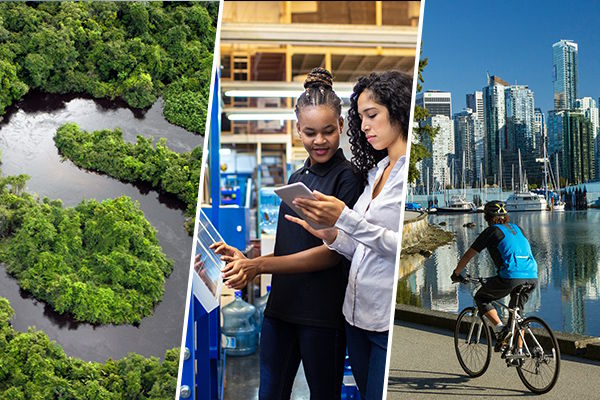
There are three images in one. On the left, the Amazon rainforest. In the middle, engineers with solar cells. On the right, the city of Vancouver.
The American continent is economically and politically diverse. It hosts five G20 members (United States, Canada, Mexico, Brazil and Argentina) as well as low-income states in Latin America and Caribbean Small Island Developing States (SIDS).
The continent as a whole accounts for one fifth of global greenhouse gas emissions, but these are distributed unequally, with two thirds of the emissions originating from North America alone. Many countries in the region have yet to define their path to decarbonisation. There are also considerable differences in the source of emissions, with North American emissions coming mostly from energy and transport, while in Latin America and the Caribbean (LAC), emissions mainly originate from land use and agriculture. The Americas are also home to countries that are very vulnerable to climate change impacts, including medium and low-income states from Central America and the Caribbean.
For these reasons combined, engagement and cooperation with the Americas is crucial to reach the Paris Agreement objectives of climate resilience and stay on the 1.5°C emission reduction pathway.
North America
In North America, cooperation with the US and Canada focuses on coordinating approaches to key global trade, climate and technology issues (via the EU-US Trade and Technology Council) and cooperation in the areas of climate, environment, clean energy transition and green industrial transformation (via the EU-Canada Green Alliance). The EU, US and Canada work closely to reduce greenhouse gas emissions, implement global initiatives (e.g. Global Methane Pledge), and advance research and innovation.
The adoption of the US Inflation Reduction Act in 2022, which provides incentives to accelerate the green transition in the US, has offered new channels and opportunities for exchanges to further strengthen EU-US bilateral cooperation on climate.
Latin America and the Caribbean
With Latin America and the Caribbean, the importance of climate action as a priority for cooperation with the EU was put in evidence during the Latin America and the Caribbean and the European Union Ministerial Meeting on Environment and Climate Change on environment and climate and at the Summit with the European Union and the Community of Latin American and the Caribbean states (CELAC) of July 2023, where the commitment to join forces to combat climate change was one of the main outcomes.
The EU’s climate diplomacy engagement in Latin America and the Caribbean aims to promote the energy transition away from coal and other fossil fuels, to enhance the use of renewables and energy efficiency, to foster carbon markets, to strengthen this region’s resilience to climate impacts and to support nature-based solutions.
Another key priority is preserving relevant ecosystems that constitute important carbon sinks in LAC countries, such as the Amazon rainforest, as well accessing the critical raw materials that are necessary for the green transition.
Climate cooperation initiatives with partner countries in the Americas
North America
- Green Alliance
- Just Energy Transition Partnerships (JETPs): the US and Canada are part of the G7, through which the EU takes part in the JETPs with multiple countries around the globe.
- EU-US Trade and Technology Council: among other matters, we discuss climate and clean technologies, and transatlantic trade in green technologies, products and services.
- EU-US High-Level Climate Action Group (HLCAG): provides a platform for EU-US exchanges and outreach vis-à-vis third countries.
Latin America and the Caribbean (LAC)
- Argentina
- Brazil
- Joint Press Release between the Minister for Environment of Brazil, Mrs. Marina Silva, and Commissioner for Environment, Mr. Virginijus Sinkevičius on the launch of a High Level Dialogue on climate and environment
- EIB lends €300 million to Banco Santander Brasil for small-scale solar energy investments
- Canada
- Chile
- Mexico
- US
